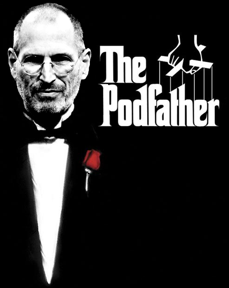Steve Jobs Begins Godfather Duties - www.techcrunch.com

Steve Jobs has resigned as CEO of Apple. This, of course, means that the company has had its spirit broken, its intellect blunted, its worth gutted. Except it doesn’t, quite. The Steve didn’t nurture this company from near-collapse to global powerhouse with snap decisions and daily briefings. No, he and his immensely capable team did it with design, forethought, and consistently staying a step or two ahead of the other guy. That’s not something that changes overnight.
He may be leaving the office, but he’s not leaving the company. Apple still belongs to Jobs — and we’ll know it when that’s no longer the case. And while he may be turning over the operational reins to his protégé, I have the feeling he’ll be making it clear who the Don is.
Realistically speaking, this is a fairly standard step-down, of course, and many former CEOs take up a leadership position on boards and advisory committees after they’ve taken their turn at the helm. Jobs is stepping down because he is no longer capable of meeting his “duties and expectations.” It turns out that being CEO of one of the world’s largest and most influential companies is a difficult job, and may not mix well with his other, more personal responsibilities. What those responsibilities are, whether it’s sickness as rumored, or simply a desire to spend more time with his family, isn’t exactly material. He’s no longer able to be the CEO, so he’s leaving. We can safely leave it at that.
What duties, then, can he be expected to fulfill? To be honest, it’s likely he’ll be able to fulfill all his important ones, while leaving the day-to-day stresses and management decisions to the capable Tim Cook.
Steve can’t make it in to briefings, but he can still advise on designs. He can’t travel for business, but he can still drop by the Mothership to see the latest prototype. He can’t fiddle with the PCB design, but he can hold the device and tell them what’s right and what’s wrong. He can’t jockey with OEMs for manufacturing share, but he can still tell his team to fold or draw. He can’t write a month-by-month prospectus, but he can still tell them where they should be a year from now. He can’t fire up the audience on stage, but he can still galvanize his closest colleagues with his vision.
It sounds to me like the man has reduced his job the parts he loves the most, and was always the best at, and outsourced all the stressful stuff to an eager successor. Don Corleone, Obi-Wan Kenobe, and the Kwisatz Haderach all rolled into one.
Not only this, but consider how companies as large as Apple work when it comes to product — especially when you’re leading the sector. Sony and Microsoft have been girding themselves for years for a console battle unlikely to occur until at least 2013. Intel has R&D projects reaching out to 2018, if not farther. Companies working on major real-life items like nuclear power research have decades mapped out. And while certainly the future is fluid, companies thrive when their leaders demonstrate both vision and flexibility. Jobs has both, and he leaves behind him for execution a roadmap stretching out five years or more. Whether he’s around for those five years may or may not be up to him, but you better believe he wouldn’t leave the ship without setting a course and making damn sure everyone on board knew it.
So while we can and should mourn the symbolic passing of the Jobs era of Apple, it’s going to be a while before his presence ceases to be felt there. He has shaped the thing and set it in motion; now he retires to enjoy his family and his fortune, while retaining the ability to sweep in strike down bad design like an avenging angel of good taste. It’s a good deal for him, a good deal for us, and still a good time for Apple.


No comments:
Post a Comment